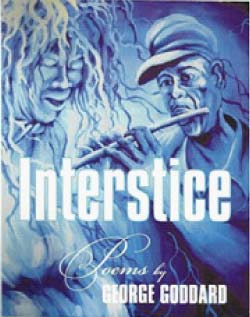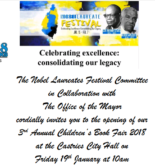Poetry is when an emotion has found its thought and the thought has found words.” —Robert Frost
At risk of offending the analytic sensibilities of a friend and mentor, I begin with this opinion: that a book of poetry is not to be read as one would a romance novel or a Marx Marvel comic book. It should be in several intermittent takes, as one would treat a glass of cognac—in deliberate slow, measured sips, allowing for the savoring of the richness of the brew.
Armed with some knowledge of the author, I anticipated much more than the sentimental, sometimes pedestrian fare peddled by some of this generation’s soi-disant poets, entrants to the art form. Thus with each swig of this fine wine imbibed, I became progressively infected by the tone, imagery and metaphors that frame this introductory volume by George Goddard.

Next to industrial relations, he is known for his precision in the use of language (whether English or French), particularly the spoken word. Those who know him, whether as trade unionist or via the political platform (he vied for the Dennery South seat in 1982 for the Progressive Labour Party), can say a thing or two about his mastery of the English language. And his poetry attests to that.
INTERSTICE is a compilation of some 30 poems—an ample amount for a slim , first-time outing—clearly limited to a thematic construct. In large measure, the writer confines himself to typical, familiar subject matter most local readers will be able to identify with, either from memory, or personal experience or which they may have come across in other works of poetry by indigenous writers.
See “Islet, Choc Bay”, for example:
Earl, do you remember a pond by the sea
by a lone coconut tree, …
And Earl, would you say,
the rabbits we never saw in the wild…
And will always hold their childhood spell…
Or “Morning Coffee”:
Moorning coffee
takes me back
to the archives of my childhood
where he flashes pictures of the ancient dibelwe (coffee maker) and
the feisty scramble for “mango la rose,” (la woz)
mango dou-i-dou…
Then turn the page to “La Carriere Under a Late-rising Moon.” Here the poet speaks anecdotally of the miseries of sugar laborers back on the old plantation:
the sugar mill on Fond d’Or knoll; …
where the whip still cracks
the souls of our backs…
Similar themes have been addressed by local writers; themes focusing on landscape, familiar faces and places, childhood escapades, romantic reminiscences, changing habits, violations wrought by ‘progress’…Mac Donald Dixon, Robert Lee, Adrian Augier, Jane King and others have visited these all too familiar topics, each according them their quota of importance, though each writer differing in their language and idiomatic mechanisms.
Mac Donald Dixon, in ‘Sent Lisi’, 2014:
By shallow seas, our lives begin
breaking through surf for seed, to thrive
where no seed springs. Only the ant
in concert sings, gorging on a rotted stump.
Jane King, in Sent Lisi, 2014:
I cannot find this island lovely in drought.
I love it best all silvery green with rain
when clouds creep off La Sociere
and down the Morne.
In his poem, “Terse Note in August,” Goddard’s view contrasts markedly with King’s:
Weeks ago only, the russet abstinence of Lent
Burnished the land with a wistful beauty—
There is no season without beauty here!
And hear Dixon again (Toutwelle magazine, 1976):
To know one village
Is to have known them all…
And Adrian Augier, in “meditation on a slice of this paradise isle” (Roseau Valley and other poems, 2003):
Now I pray beside the sea…
That the urban creep of streetlights
will not banish all our spirits to some green blackness;…
The idea here is not to suggest that there’s a shortage of themes, but to underscore the apparent pre-occupation of Saint Lucian writers with these topics and the constant return to them by succeeding generations. However, the differentiating feature is the distinctive treatment by each writer. What also captures the attention is the maturity of Goddard’s vocabulary. INTERSTICE offers quite a menu, which allows the reader to weigh his versatility. Read, for example, “Hills.”
The rain season’s clouds
Cry a flood
For a love that is
gone…
Goddard, a somewhat debonair character, writes variously on love, and he includes, unabashedly, samples on the naked flesh. Read “Bernadette,” or consider these lines in “At Beanefield” that young lovers might be well advised to take note of.
…yes, lust
That’s what it was
And yet we fooled ourselves
We called it love—
Only the gods know love
And the gods are dead.
And for another love that’s gone, experience what the writer presumably experienced, or extracted out of his imagination, or from his observation of others in the poem “Through a Window.”
It was here at the top of the world
that I would slip from the highs of pulsing nipples
to nestle between your thighs, naked,
unfettered in the blitheness of youth.
Besides these, the writer’s concerns with other issues make for good reading. In “If I Had Thought,” he laments the damage to the environment by modern development.
…oblivious of this ‘progress’ thing about to happen…
to wake to a nightmare
that does not end:
mangroves falling,
the high-rising arrogance of condominiums;
machines keep on…coming.
And who, growing up in rural 60s or 70s Saint Lucia, could not relate to “Fig Vet”? (pg. 39). Or the title poem, “INTERSTICE”, where the poet spews his anger, it seems, against the disruption of the Grenada Revolution of the 1970s, 1980s:
Nothing devastates more completely…
So that we doubt that the vision
Was indeed a vision—not a dream
Blasted unredeemable by the bombs, an invasion
An intervention (call it what you like
It’s the same blasted thing)! Powerful!
But there’s more. Read on.
Amid all the exuberance of the successful launch of a debut collection, one is led to wonder whether at some stage there was a measure of doubt that some of these lyrics might ever see the light of day? For example, in “Barre de L’Ile,” the poet reveals,
In the mist of my
Depression
You listen to my reading
to the poetry that I give you
And wonder
Whether I should ever
Give it to the world;…
Not unlike Derek Walcott, who mulls over the future of his poetry (Collected Poems 1948-1984, pg. 304), though the context differs sharply:
What is this new odour in the air
that was once salt,…
and my children’s eyes
already seem like horizons,
and all my poems, even this one, wish to hide
Let me say in conclusion, that this is a poetry that does not concern itself with some of the finer articles of the poetic credo, like rhyme, metre and other such compositional constructs. It is just good free verse that was considered good for packaging and dispatching. It is that fluent and effective. And given that George Goddard appears to have found his place already among the major league of Saint Lucian writers, it means that we can expect his output to grow in the foreseeable future.
INTERSTICE is truly a satisfying collection.
Related Post
Interstice – George Goddard’s Effective Poems (book review)
George Goddard Publishes “Interstice” (book launch press release)
Recent Post by Modeste Downes
HOW IT ALL BEGAN (book review)
FATED (book review)
The Passing of a Great Man (poem)
Thanks, Rameau (poem)
![]()





3824tj
Гама Казино Скачать на Андроид. https://github.com/sewer80/gamma
I simply wanted to thank you so much once more. I’m not certain the things I would’ve created in the absence of the actual opinions shared by you regarding that problem. It has been the terrifying difficulty in my position, however , witnessing this professional mode you resolved it forced me to weep for contentment. I am just grateful for this service as well as have high hopes you know what a powerful job you were carrying out training many others using your website. Most likely you haven’t met any of us.
Thank you for sharing superb informations. Your web-site is so cool. I am impressed by the details that you have on this website. It reveals how nicely you understand this subject. Bookmarked this web page, will come back for extra articles. You, my pal, ROCK! I found simply the information I already searched everywhere and simply couldn’t come across. What a perfect website.
magnificent points altogether, youu simjply gained a new reader.
What could yyou sugest about your puut upp that you jjust maade
some days ago? Anny certain?
Great amazing things here. I?¦m very happy to peer your article. Thanks a lot and i am looking ahead to contact you. Will you please drop me a mail?
Good website! I really love how it is easy on my eyes and the data are well written. I am wondering how I might be notified whenever a new post has been made. I have subscribed to your RSS feed which must do the trick! Have a nice day!
I genuinely enjoy reading on this web site, it contains great blog posts.
I’m not sur whede youu are getting your info, butt great
topic. I needs too sppend some timne leaarning more orr understanding more.
Thanks forr great infrormation I wwas lopoking for
thhis info ffor mmy mission.
You actually make it appear so easy together with your presentation however I to find this matter to be actually something which I believe I’d never understand. It seems too complicated and extremely broad for me. I’m taking a look forward in your subsequent post, I¦ll attempt to get the hang of it!
I appreciate, cause I found just what I was looking for. You have ended my four day long hunt! God Bless you man. Have a great day. Bye